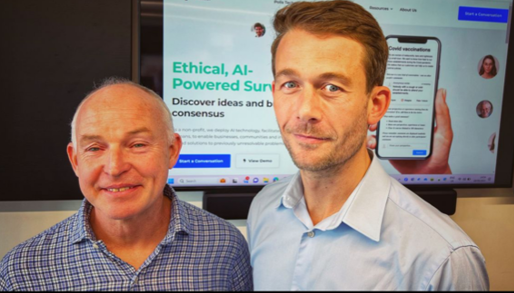Why UK Councils Should Use Polis to Find Ideas from Their Population and Build Consensus
In an era marked by the need for greater civic engagement and effective governance, UK Councils are increasingly turning towards innovative approaches to connect with their constituents. Amidst this backdrop, Polis, an AI-driven survey tool, is emerging as a pivotal solution for councils to tap into community insights. The Crowd Wisdom Project, with its rich experience in facilitating Polis surveys for various councils and organizations, highlights the unmatched potential of this technology in enhancing local governance.
Polis: Beyond Traditional Surveys in Capturing Local Voices
Polis stands out with its capacity to slice through traditional political divides, providing councils with deeper, nonpartisan insights into local issues. This contrasts sharply with standard surveys, which often get entangled in left vs. right politics, failing to capture the nuanced opinions of the populace.
Advantages for Councils:
- Local Relevance: Tailored to extract insights specific to localities, Polis ensures that councils receive data that directly applies to their unique community challenges.
- Nonpartisan Engagement: Moving beyond the left-right dichotomy, Polis fosters inclusive and constructive dialogue, focusing on problem-solving rather than political point-scoring.
- Accurate and Honest Feedback: The anonymity afforded by Polis encourages participants to provide honest feedback, leading to more reliable and accurate data.
The Crowd Wisdom Project: Demonstrating Polis’ Efficacy
The Crowd Wisdom Project’s success in utilising Polis for a variety of clients attests to the platform’s versatility and impact. This includes UK Councils like Wandsworth Council, Chelsea and Kensington Council, Cheshire East Council, Lancaster Council, and Knaresborough Voice. The Harrogate and District Law Society, environmental groups, pharmaceutical companies, and law firms have also benefited from Polis, gaining valuable insights that have driven decision-making and policy formulation.
High Engagement and Enhanced Legitimacy
In contrast to the generally low voter turnout in UK council elections, Polis surveys have shown remarkable levels of engagement. For instance, in a London council survey conducted by the Crowd Wisdom Project, the average voter participated an impressive 98 times. Such active participation not only increases the legitimacy of the survey results but also ensures that a wide range of voices is heard and considered in the decision-making process.
Cost-Effectiveness and Sustainability
Polis surveys offer an affordable alternative to traditional council surveys without compromising on the depth and quality of insights. This cost-effectiveness is particularly crucial in times of budgetary constraints, enabling councils to engage with their communities without straining their finances.
Real-World Impact of Polis
The tangible impact of Polis is evident across various sectors. Wandsworth Council used Polis to engage residents regarding the difficult issue of clean air, while environmental groups utilised it to build consensus on sustainability initiatives and road speeds. Such applications showcase Polis’s ability to facilitate informed decision-making and drive forward community-supported initiatives.
Conclusion: Embracing a New Era of Community-Centric Governance
For UK Councils seeking to foster a more connected, responsive, and inclusive governance model, Polis represents an invaluable tool. Its proven track record of fostering high engagement, providing nonpartisan insights, and being cost-effective—as demonstrated by the diverse client base of the Crowd Wisdom Project—positions Polis as a gateway to a new era of community-centric governance. In an age where digital transformation is reshaping public engagement, adopting innovative tools like Polis is not just beneficial but essential for councils aspiring to make informed, inclusive, and consensus-driven decisions. Polis not only bridges the gap between councils and their constituents but also paves the way for a more harmonious and effective governance model, where every voice is heard and valued.





